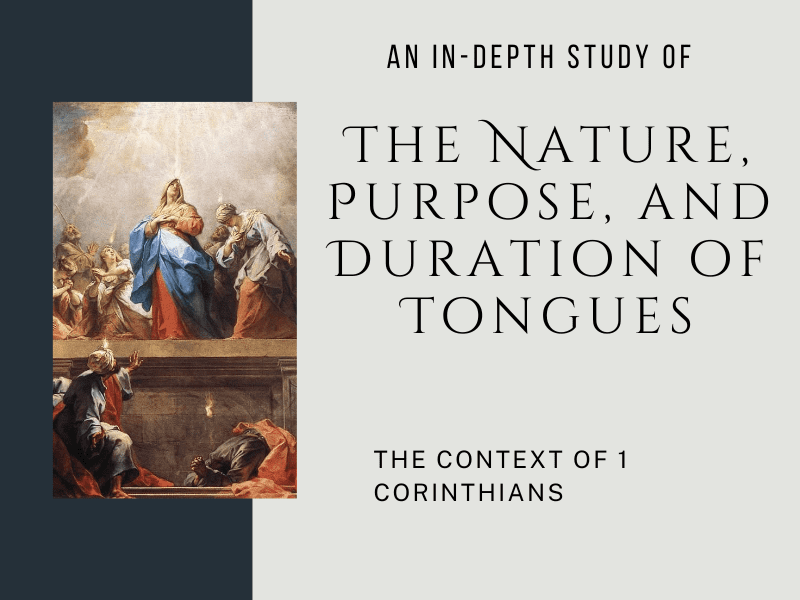This article is part of my resource titled: An In-Depth Study of the Nature, Purpose, and Duration of Tongues.
No study of the gift of tongues would be complete without surveying 1 Corinthians 12-14. And no study of any topic would be accurate if we didn’t understand the context surrounding the passages in question. For this reason, it’s vital that we establish the context of 1 Corinthians as a whole before beginning our survey of chapters 12-14 which are, for the sake of this study, of most interest to us.
The Date and Occasion for the Letter
The church of Corinth, to whom this letter is addressed, was established by Paul on his second missionary journey between the years of A.D. 50-52 (Acts 18:1-11). Paul writes this letter from Ephesus around A.D 55 on his third missionary journey (1 Cor 16:8).
During this three year period the church of Corinth had devolved. Instead of growing into mature believers, Paul writes to them as people who are “still of the flesh” (1 Cor 3:3). Reports had come to him concerning divisions within the church, gross sexual immorality, preferences being displayed for church leaders, tolerance of sin and lack of discipline thereof, believers bringing lawsuits against one another, and the misuse of Christian liberty. These reports and Paul’s response to them constitute the first part of the letter (chapters 1-6).
The second part of the letter, chapters 7-16, shows Paul addressing matters of which the Corinthian church had previously written to him. Starting in 1 Corinthians 7:1 Paul begins to write “concerning the matters about which you wrote.” These matters included marriage, the betrothed and widows, food offered to idols, spiritual gifts, collecting donations for the saints at Jerusalem, and their apparent request to have Apollos visit them. Paul also addresses the Corinthians’ criticism of himself with regards to his apostolic rights and authority, their abuse of the Lord’s Supper, and their denial of the resurrection.
It was for the purpose of correction and instruction that Paul wrote the letter of 1 Corinthians. This understanding must also be applied to chapters 12-14 where Paul deals extensively with spiritual gifts, namely speaking in tongues and prophecy. Many of the arguments made by charismatics in support of their use of tongues comes from verses within these chapters. However, when we examine these verses in light of the corrective and instructive nature of 1 Corinthians as a whole, it’s easy to see how they’ve been misinterpreted and misused by modern tongue speakers. We’ll soon see that the support charismatics thought they had in these verses is nonexistent.
The Flow of Thought in Chapters 12-14
Another important matter to consider is the flow of thought of chapters 12-14. While this doesn’t necessarily help us in our interpretation of certain verses, it helps bring clarity to Paul’s discourse on spiritual gifts as a whole which occupies more space in 1 Corinthians than any other topic which he addresses.
Chapter 12
Paul begins his discourse with the following words: “Now concerning spiritual gifts, brothers, I do not want you to be uninformed” (1 Cor. 12:1). It was important to Paul that the Corinthian church understood matters related to the Spirit, namely the gifts, services, and activities thereof, and their complementary relationship to one another.
In v.4-11 Paul gives us a list of spiritual gifts which he says, “are empowered by one and the same Spirit, who apportions to each one individually as he wills” (1 Cor. 12:11). Every gift is given by the Holy Spirit and He is sovereign over who receives which spiritual gifts. Because all of these endowments are God given, we should not esteem one as being any more or less important than the other. Although Paul himself states that prophecy is superior to tongues later on, this is not to say that tongues didn’t serve a purpose. Every manifestation of the Spirit was given for the common good of the church, including those which were deemed inferior in some regards (1 Cor 12:7).
Paul explains this concept in v.12-31 where he compares the body of Christ to a physical body. His purpose in doing so is to point out that just as the human body is made up of many different parts, all of which contribute to the functionality thereof, so it is with the body of Christ. Each member was endowed with a different spiritual gift which was meant to work in conjunction with the gifts of others so as to make the body of Christ complete.
Each member of the human body works together for the good of the body itself. The eye doesn’t see for its own sake but for the sake of the rest of the body. Likewise, a person who has the gift of prophecy doesn’t prophecy for his own merriment or upbuilding but for the sake of the church as a whole. This is the purpose for which spiritual gifts are given.
Paul then points out that not every believer would receive the same spiritual endowments when he asks a series of rhetorical questions. In 1 Cor. 12:29-30 he asks, “Are all apostles? Are all prophets? Are all teachers? Do all work miracles? Do all possess gifts of healing? Do all speak with tongues? Do all interpret?” The obvious answer is no. Being that the Holy Spirit is sovereign over who receives which spiritual gifts, and various gifts are necessary for the completeness of the body of Christ and its functionality, it makes no sense to believe that every believer would be equipped with the same spiritual gifts.
After making these points Paul ends the chapter by declaring to the Corinthians that a “more excellent way” exists.
Chapter 13
The “more excellent way” Paul just mentioned is the way of love. Throughout this chapter Paul demonstrates the superiority of love over all things including supernatural manifestations of the Spirit. He also demonstrates the context in which the gifts of the Spirit are to be operated in. If spiritual gifts were exercised without love as the basis for their use, then they would ultimately be of little value.
Paul says, “If I speak in the tongues of men and of angels, but have not love, I am a noisy gong or a clanging cymbal. And if I have prophetic powers, and understand all mysteries and all knowledge, and if I have all faith, so as to remove mountains, but have not love, I am nothing. If I give away all I have, and if I deliver up my body to be burned, but have not love, I gain nothing” (1 Cor 12:1-3). The point is that regardless of the abilities you have as a believer, if they’re not used in love then they’re of no lasting value.
To the Corinthians who were “not lacking in any gift” (1 Cor. 1:7), this certainly would have put things in perspective. They could heal and perform miracles, speak in tongues and utter words of wisdom and knowledge, distinguish between spirits and interpret tongues, but none of this was worth anything, nor could it accomplish anything without love. That love was and is superior to spiritual manifestations is seen in that, without it, these manifestations are of little worth.
Paul further demonstrates the superiority of love when he speaks of its eternal nature. “Love never ends,” says Paul (1 Cor 13:8). But prophecies, tongues and knowledge will. These gifts of the Spirit will at some point cease but love will endure forever.
Chapter 14
In the final chapter of this discourse, Paul contrasts the gift of tongues and prophecy. Having just discussed the motive that should lie behind the use of all spiritual gifts, Paul encourages the Corinthians to “earnestly desire” the gift of prophecy due to its ability to build up the entire church. “The one who speaks in a tongue,” says Paul, “builds up himself, but the one who prophesies builds up the church” (1 Cor 14:4). The purpose of spiritual gifts is never self edification. As previously stated, each individual member of both the human body and the body of Christ works collectively for the good of the whole. Therefore prophecy, which edifies the entire body, is superior to tongues which only builds up the individual speaking them unless there is an interpreter present (1 Cor. 14:5).
The purpose of this contrast is to point out, not necessarily the superiority of prophecy over tongues, although it is a superior gift, but to demonstrate that that which is most beneficial to the body of Christ should be sought after. Prophecy was esteemed by Paul as the most beneficial gift one could obtain due to its contribution to the church and therefore he encouraged its use. As opposed to tongues which, when left uninterpreted, only benefited the individual, prophecy always benefited the collective body of Christ.
After making this contrast and setting the minds of the Corinthians on the edification of the church, Paul shifts his attention to orderly worship which is in itself an aspect of church edification. If when the church came together each “has a hymn, a lesson, a revelation, a tongue, or an interpretation” (1 Cor. 14:26) chaos and disorder is likely to ensue. But if things are done decently and in order, then the atmosphere of service is one wherein all participants can be edified. For this reason Paul says to “let all things be done for building up” and that “all things should be done decently and in order” (1 Cor 14:26, 40) so that when the church comes together it’s a beneficial experience to all.
In Conclusion
As we’ve seen, the context of 1 Corinthians is highly corrective and instructive. The Corinthians immaturity and lack of understanding required that Paul write to them concerning the matters which had been reported to him of their misconduct and of those which they had previously written to him asking for guidance.
With regards to the context and flow of thought in chapters 12-14, we see that the same sentiment is expressed by Paul. He’s giving them instructions for the proper understanding and use of spiritual gifts. Most of what he’s saying is not affirmative of the Corinthians understanding and use thereof, but corrective and instructional. He’s guiding them in regards to what they ought to be doing, not affirming what they’re doing. The corrective nature of these chapters can’t be overlooked if we’re going to make proper sense of the verses within them that are used by charismatics today to support their use of tongues.

